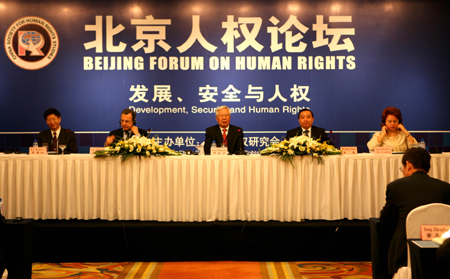Dalai Lama's hypocrisy rapped
By Han Lei (chinadaily.com.cn)
Updated: 2008-04-22 23:12
Updated: 2008-04-22 23:12
A Tibetan expert slammed Dalai Lama's hypocrisy on Tuesday in response to the exiled monk's accusation of human rights violations by the Chinese government.
"He wants to spread lies that China violated human rights in Tibet," said Sherab Nyima, vice president of the Central University for Nationalities at the Beijing Forum on Human Rights.
The scholar, who is a Tibetan ethnic himself, said: "The Dalai Lama talked about human rights, but what did he do for human rights when he was a ruler?"
Buddhism was stipulated as the only legal religion, and other religions were banned as heresy, he told reporters on the sidelines of the forum. That is in sharp contrast to the current religious freedom protected by the constitution across the country, including the Tibet Autonomous Region.
Under the feudal serfdom of old Tibet, most people were merely slaves who were denied of basic human dignity. The serfs lived miserably with no personal freedom, and no right of life, not to mention political and other human rights, he said.
Sherab pointed out that Dalai Lama just used human rights as a tool to achieve the purpose of "Tibet independence."
"The Dalai Lama said during a visit to Europe in 2007 that the year 2008 is a key year and Olympic Games might be the last chance for Tibetans," he told the forum.
Talking about today's Tibet, Indian editor Ram Narasimhan said welfare and quality of life are two key indicators of human rights, sounding similar to Chinese government's emphasis on the rights to life and development in its drive to improve human rights.
Ram, the editor-in-chief of The Hindu Newspaper Group, has visited Tibet twice in the past seven years. Local people's living standards have seen jumps and leaps in these years, Ram told the forum, calling that is in itself a reflection of human rights progress.
He said he was deeply impressed by the farmers who got rich through hard work, subsidies from the central government and new opportunities provided by a construction boom.
|
||
|
||
|
|
|
|
